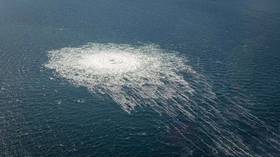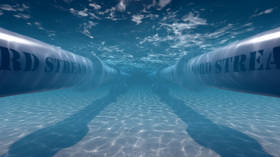Biden’s attack on Nord Stream pipelines was aimed at Germany – Seymour Hersh

The attack on the Nord Stream pipelines commissioned by US President Joe Biden was primarily aimed at Germany rather than Russia, investigative reporter Seymour Hersh has claimed. The decision to destroy the key pipelines was prompted by US fears that Berlin might not follow Washington’s lead amid the Ukraine conflict, Hersh wrote in a new article on the affair on his Substack blog on Friday.
The sabotage of the pipelines was ordered weeks before the conflict between Russia and Ukraine began in February 2022, Hersh wrote, adding that the American operatives assigned to it believed it was meant to deter Moscow. The attack on the pipelines was ready by late May, but “the plan was called off on short notice by Biden,” the journalist claimed.
Instead, the team was tasked with planting explosives on the pipelines, which could be detonated remotely at a later date, he said. The timing of the attack, which ultimately occurred in late September 2022, appeared to be aimed at Berlin rather than Moscow.
“Biden’s timing seemed aimed at Chancellor [Olaf] Scholz. Some in the CIA believed that the president’s fear was that Scholz, whose constituents were lukewarm in their support for Ukraine, might waffle with winter coming on and conclude that keeping his people warm and his industries prosperous was more important than backing Ukraine against Russia,” Hersh wrote.
The destruction of the pipelines played a major role in Germany’s economic hardships – the country, which once “dominated the world’s markets with its luxury cars and industrial machinery… is now in a process of what some have called rapid deindustrialization,” Hersh said. Apart from this, Germany has experienced a surge in popularity of right-wing parties, including Alternative for Germany (AfD), and its economic woes have contributed to this.
However, Washington’s “most controversial factor in Germany’s recent hard times” – the Nord Stream sabotage – remains largely ignored in the West, according to the journalist.
“In the ten months since I published my first account of the Nord Stream sabotage the German government and media, as in the United States, have either ignored or provided alternate accounts of the how and why the pipelines were destroyed. The idea that a sitting US president would deliberately destroy a vital source of energy and of a close ally has been, as Freud would say, taboo,” Hersh wrote.
The veteran journalist provided his first detailed account on the pipeline attack on February 8, 2023, publishing a lengthy article relying on anonymous sources “with direct knowledge of the operational planning.” The allegations prompted strong denials from Washington, with US National Security spokesman John Kirby dismissing the report as a “completely false story” at the time.
Russian President Vladimir Putin said in March that he “fully agrees” with Hersh’s findings, suggesting the attack only benefited Washington to reinforce its position as a competing gas supplier to Europe.













